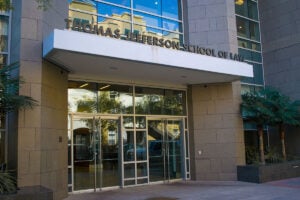
(Photo by Visitor7 via Creative Commons/Wikipedia)
Ever since the American Bar Association began cracking down on law schools that seemed to be playing it fast and loose with accreditation standards, it was only a matter of time before the organization dealt out the ultimate punishment to a deserving law school — and now, that time has come for yet another poorly performing school. This afternoon, the ABA informed Thomas Jefferson School of Law that it intended to strip the school of its accreditation. This will be the second time that the ABA has revoked accreditation from a fully accredited law school.
Thomas Jefferson School of Law’s numerous weaknesses and failures have been documented in these pages for years. From its dubious admissions practices to its repeated bar-exam embarrassments to its depressing (and allegedly deceptive) employment statistics, this institution has been maligned in the press for good reason. These days, the school is lucky if more than 25 percent of its graduates are able to pass the exam (which tracks with its unemployment and underemployment rates).

Why Law Firms Are Moving Beyond The Billable Hour
Explore 5 expert-backed reasons law firms are rethinking the billable hour and how legal billing software is leading the way.
If you recall, in May 2011, Thomas Jefferson was the first law school to be sued over its allegedly deceptive employment statistics. The case inspired more than a dozen other class-action lawsuits to be filed against law schools for publishing allegedly deceptive employment statistics and salary data in order to bait new students into enrolling, but the Thomas Jefferson case was the only one to go to trial. The jury in that case was ultimately unsympathetic to the plaintiff’s claims, handing TJSL a 9-3 verdict.
Six years later, in November 2017, the ABA stepped in and put the school on probation for being woefully out of compliance with accreditation standards. In May 2018, after being publicly censured by the ABA for its insufficient financial resources, Thomas Jefferson closed its campus and moved into an office building. Later that same year, in October 2018, the school announced that it would not be enrolling a class for the spring semester, a sign of trouble ahead. After more than a year in a situation where “only immediate and substantial action” could put the school back on the right track, the ABA found TJSL was still out of compliance, and decided it was time for the school to face the music.
Normally, Thomas Jefferson would be unable to enroll additional students because of the ABA’s decision to withdraw its approval of the school, but last fall, afraid it would lose ABA accreditation, TJSL applied for and was later granted California accreditation. Nevertheless, the school must create a teachout plan to ensure that current students will be able to complete their degrees and take the bar exam.
Thomas Jefferson has 30 days to appeal the ABA’s decision, and the administration has pledged that an appeal will be made. In a statement released by the school, the administration said they were “disappointed by this capricious decision and strongly disagree[] with the Council’s findings.” The ABA’s decision to withdraw its approval of Thomas Jefferson will not be effective until the outcome of the appeal, which may take up to nine months to complete. TJSL will remain an accredited law school until then.
Unfortunately for students, many of whom have put a significant amount of student debt on the line for a degree from Thomas Jefferson School of Law, the school’s chances of success are looking about as good as its graduates’ recent bar exam performances — that is to say, failure may be in this law school’s future.
(Flip to the next page to see the ABA’s accreditation decision.)
Withdrawal of Approval: Thomas Jefferson School of Law [American Bar Association]
 Staci Zaretsky is a senior editor at Above the Law, where she’s worked since 2011. She’d love to hear from you, so please feel free to email her with any tips, questions, comments, or critiques. You can follow her on Twitter or connect with her on LinkedIn.
Staci Zaretsky is a senior editor at Above the Law, where she’s worked since 2011. She’d love to hear from you, so please feel free to email her with any tips, questions, comments, or critiques. You can follow her on Twitter or connect with her on LinkedIn.
